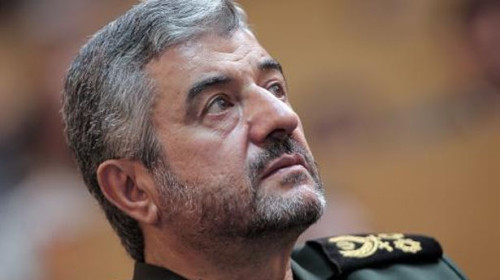PHOTO: Revolutionary Guards Commander Mohamamd Ali Jafari
LATEST: Tehran Friday Prayer — Rouhani Government Must Stop Support of “Seditious” Publications
The Islamic Revolutionary Guards Corps added to the pressure on President Rouhani on the economic and cultural fronts on Friday.
Since January, Rouhani has come under increasing attack by hardliners over his promise to open up Iranian culture and media. Ten days ago, the Supreme Leader endorsed that pressure, and this week Ayatollah Khamenei chided the Government over failure to revive Iran’s struggling economy.
See Iran Analysis: Rouhani Struggles with Economy and “Culture War”
Yesterday the commander of the Guards, Mohammad Ali Jafari, outlined its policies “to fulfill the slogan of Culture and Economy with National Determination and Jihadi Management issued by the Supreme Leader” during Iranian New Year.
Jafari then challenged the President to accept the presence of the IRGC outside the military sphere:
In the economic arena, the IRGC and Basij are prepared to perform an active and effective role. The honorable administration, however, must request this matter from us and lay the groundwork, and make a demand in reality….
The Corps has been present in the arena of culture for some years. Appropriate planning must take place with attention to the Supreme Leader’s emphasis on the category of culture and provide depth to previous works.
Soon after his inauguration last summer, Rouhani tried to contain the Guards, invoked the edict of the late Ayatollah Khomeini that the IRGC must not be involved in political matters. At the same time, he reassured the IRGC that the Government would not move against its extensive economic interests.
However, Jafari not only pressed for recognition of the Guards’ place, but also that of Iran’s militia: “In the current situation, the Basij has a massive capacity in various economic arenas, especially in resistance economy. It can perform a fundamental role in the arena of resistance economy and making the economy populist.”
The head of the Basij University Students Organization, Mohammad Heidari, said it was ready to “perform in the cultural and economic arenas”, including “establishing jihadi camps towards facilitating development of aiding the deprived”.
(Hat tip to Iran Tracker for translation)
Tehran Friday Prayer: Rouhani Government Must Stop Support of “Seditious” Publications
The Tehran Friday Prayer, delivered by Ayatollah Ahmad Khatami, focused on the kidnapped Iranian border guards in Pakistan; however, it did not suspend the cultural battle against the Rouhani Government.
To the contrary, Khatami said, “The Guidance Ministry does not have the right to give the treasury (funding) to books, newspapers, and weeklies that undermine the people’s beliefs.”
Friday Prayer leaders in other cities said that “the enemies of the Islamic Republic have chosen the arenas of culture and economy to confront Iran” and that “the jihadi management of officials and the responsible participation of the people is the strategy to confront this widespread attack”.
Top Official Salehi Set Outs Iran Line on Key Issues in Nuclear Talks
A week before the resumption of nuclear talks between Iran and the 5+1 Powers, the head of the Atomic Energy Organization has restated Tehran’s lines on key issues.
Ali Akbar Salehi indicated that Iran would not accept a mandated reduction in the number of its centrifuges for enrichment of uranium: “Our advice is not to even discuss the number of centrifuges….It is possible for some centrifuges to be different type than others.”
Salehi said that, of Iran’s 19,000 centrifuges, about 9,000 are active.
The US and its European partners have said they want a significant reduction of the number of centrifuges in a comprehensive nuclear agreement.
Iran has agreed to suspend enrichment of uranium to 20% under November’s interim deal; however, it maintains that it has the right to enrich to 5%.
Salehi also spoke about another leading issue, the status of the under-construction Arak heavy-water reactor.
He said development had not been halted, although “we accepted in the Geneva Accord not to install some major equipment in these six months”. He also indicated the reactor might be re-designed to alleviate Western concerns about plutonium by-product, which could be used in a militarized nuclear program.
Elite Qods Force Tasked With Securing Pakistan Border
The elite Qods Force of the Islamic Revolutionary Guards Corps has been mandated to provide security on the border with Pakistan, following the abduction and execution of Iranian border guards.
The mandate covers 300 kilometers (186 miles) of the border area near the southeastern city of Saravan in Sistan and Baluchestan Province.
The Sunni insurgency Jaish ul-Adl has carried out a series of attacks on Iranian forces in the province since last summer. In October, it killed 14 guards. On February 6, it abducted five guards, one of whom it executed last week.
Following the order, Guards Commander Mohammad Ali Jafari visited the border area and inspected his forces.
The head of the Supreme National Security Council, Ali Shamkhani, said, “Our security forces are undertaking good planning to organize the eastern borders and prevent the repetition of such terrorist events. We will (destroy) terrorist groups like Jaish ul-Adl soon.”

